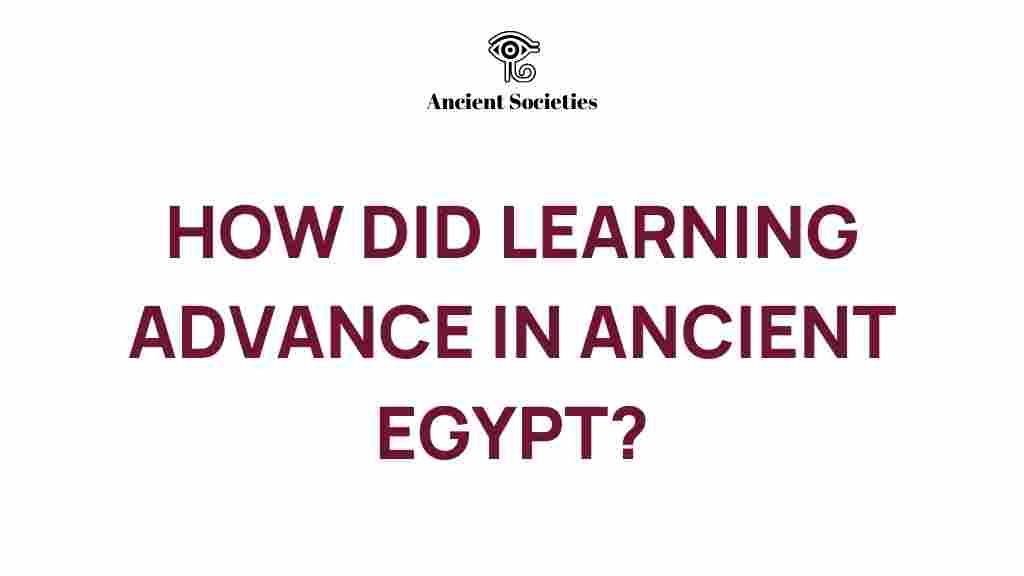Unveiling the Secrets of Learning in Ancient Egypt
Ancient Egypt is renowned for its monumental achievements in various fields, including architecture, medicine, and agriculture. However, one of the most fascinating aspects of this ancient civilization is its approach to education and the preservation of knowledge. This article delves into the educational practices of Ancient Egypt, the role of scholars, the significance of hieroglyphics, and the culture that fostered advancements in society.
The Foundation of Education in Ancient Egypt
Education in Ancient Egypt was deeply intertwined with the culture and religion of the time. The primary purpose of education was to prepare individuals for their roles in society, particularly in government, religion, and the skilled trades. Here are some key components of education in Ancient Egypt:
- Religious Instruction: Most education was conducted within temples, where priests taught the young about religious texts, rituals, and the mythology of the gods.
- Practical Skills: Boys learned trades from their fathers, while girls were educated at home in household management and child-rearing.
- Writing and Record Keeping: Hieroglyphics played a crucial role in education, as literacy was essential for administrative tasks and religious duties.
The Role of Hieroglyphics in Education
Hieroglyphics, the writing system of Ancient Egypt, is one of the most iconic symbols of this civilization. Understanding hieroglyphics was vital for anyone wishing to advance in society. Here’s how hieroglyphics influenced education:
- Writing System: Hieroglyphics consisted of over 700 symbols used for writing everything from religious texts to administrative records.
- Learning Methodology: Students learned to read and write hieroglyphics through rote memorization and practice, often inscribing on papyrus or stone.
- Preservation of Knowledge: Hieroglyphics allowed for the documentation of history, culture, and knowledge, which was crucial for future generations.
Scholars and Their Contributions
Scholars in Ancient Egypt were highly respected individuals who contributed significantly to the body of knowledge of the time. Their work encompassed various fields, including mathematics, astronomy, medicine, and literature. Here are some notable aspects regarding scholars:
- Education Centers: The most prominent centers of learning were temples and schools, where scholars trained students in various disciplines.
- Knowledge Transmission: Scholars wrote extensively, creating texts that would serve as educational material for future generations.
- Interdisciplinary Studies: Scholars often engaged in interdisciplinary studies, linking mathematics, astronomy, and medicine, reflecting the holistic nature of Ancient Egyptian education.
Advancements in Knowledge and Society
The educational practices of Ancient Egypt led to significant advancements in various fields. The emphasis on learning and knowledge contributed to the overall progress of society. Here’s how education influenced advancements:
- Mathematics: Ancient Egyptians developed a decimal system and made advancements in geometry, which were essential for construction and land surveying.
- Astronomy: Scholars tracked celestial movements, leading to the creation of calendars that were vital for agricultural planning.
- Medicine: Medical knowledge was advanced through the study of anatomy and the application of herbal remedies.
The Cultural Context of Education
The culture of Ancient Egypt placed a high value on knowledge and learning. This cultural appreciation for education was reflected in several ways:
- Literature: The Egyptians produced a wealth of literature, including religious texts, poetry, and instructional manuals.
- Art and Architecture: Artistic endeavors often depicted scenes of education and knowledge, emphasizing their cultural importance.
- Religious Beliefs: Education was seen as a means to achieve a better understanding of the divine, with many scholars serving as priests.
Step-by-Step Process of Learning in Ancient Egypt
The learning process in Ancient Egypt was systematic and structured. Here’s a step-by-step overview of how education was typically administered:
- Initial Exposure: Children were exposed to basic teachings at home, where parents taught them practical skills.
- Formal Education: Boys were often sent to temple schools to receive formal education in reading, writing, and mathematics.
- Specialization: As students progressed, they would specialize in fields such as medicine, law, or administration.
- Apprenticeships: Many students would then enter apprenticeships under skilled practitioners to gain hands-on experience.
- Scholarship: Those who excelled could become scholars, contributing to the body of knowledge and teaching others.
Troubleshooting Tips for Understanding Ancient Egyptian Education
For those interested in studying the educational systems of Ancient Egypt, here are some troubleshooting tips to enhance your understanding:
- Engage with Primary Sources: Reading original texts and inscriptions provides direct insight into their educational practices.
- Utilize Visual Aids: Diagrams and images of hieroglyphics can aid in understanding their writing system.
- Join Discussion Groups: Engaging with others who share an interest in Ancient Egypt can provide diverse perspectives and insights.
- Online Resources: Utilize online platforms like Egyptian Antiquities for additional information and resources.
The Legacy of Ancient Egyptian Education
The educational system of Ancient Egypt laid the groundwork for many modern educational principles. The emphasis on knowledge, critical thinking, and practical skills can still be seen in today’s educational frameworks. The legacy of their scholars and their contributions continues to influence various fields of study to this day.
Conclusion
In conclusion, the secrets of learning in Ancient Egypt reveal a sophisticated educational system that was vital to the advancement of their society. Through the study of hieroglyphics, the contributions of scholars, and the cultural emphasis on knowledge, Ancient Egyptians created a legacy that has endured through the ages. Understanding their approach to education not only provides insight into their civilization but also highlights the importance of knowledge in shaping societies. As we continue to explore the depths of Ancient Egyptian history, we uncover the timeless value of education and its role in the advancement of culture.
This article is in the category History and created by AncientSocieties Team
